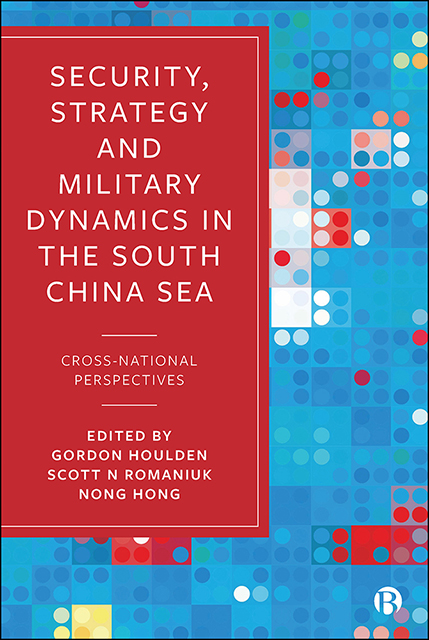Book contents
- Frontmatter
- Contents
- List of Tables
- Notes on Contributors
- Foreword
- Introduction: Strategic Challenges and Escalating Power Rivalry in the South China Sea
- 1 Between Competition and War: Complex Security Overlay and the South China Sea
- 2 The South China Sea as an Echo Chamber of Chinese Foreign and Security Policy
- Part I Claimants of the Contested South China Sea
- Part II Non-Claimants in Southeast Asia
- Part III Quadrilateral Security Dialogue States
- Part IV Non-Claimants in Europe and Eurasia
- Conclusion: Looking over the Horizon – Prospects for Settlement of the South China Sea Dispute?
- Index
16 - Britain’s Pivot to Asia: The Big Picture
Published online by Cambridge University Press: 13 April 2023
- Frontmatter
- Contents
- List of Tables
- Notes on Contributors
- Foreword
- Introduction: Strategic Challenges and Escalating Power Rivalry in the South China Sea
- 1 Between Competition and War: Complex Security Overlay and the South China Sea
- 2 The South China Sea as an Echo Chamber of Chinese Foreign and Security Policy
- Part I Claimants of the Contested South China Sea
- Part II Non-Claimants in Southeast Asia
- Part III Quadrilateral Security Dialogue States
- Part IV Non-Claimants in Europe and Eurasia
- Conclusion: Looking over the Horizon – Prospects for Settlement of the South China Sea Dispute?
- Index
Summary
Introduction
Despite being the world's fifth largest economy when measured in terms of gross domestic product (GDP), having the sixth largest military budget, being a nuclear power and a permanent member of the UN Security Council (UNSC), and member of, inter alia, the North Atlantic Treaty Organization (NATO) and the G7, the United Kingdom (UK) is facing a period of deep uncertainty. This uncertainty is in part borne out of “Brexit,” but equally significantly is borne out of a requirement, amid decreasing economic and military power, to redefine its role in the world and adapt to the changing geopolitical, economic and military landscape – a landscape that potentially has Asia as its fulcrum and Southeast Asia at its heart.
The UK economy is dominated by the service sector that accounts for 80 per cent of GDP and as such the UK is heavily reliant on trade to satisfy the needs of its citizens and businesses. This trade is in part facilitated by the UK's “Red Ensign” merchant navy fleet, which is the tenth largest in the world, and the Royal Navy, which is widely considered to be one of the top five most powerful navies, yet both had been in decline until recently, numerically in terms of ship numbers and also in terms of influence. This decline is not without consequence, most acutely in respect of the Royal Navy's ability to deploy globally and simultaneously to various areas of operation. This has been thrown into sharp relief by events in the summer of 2019, in which the Iranian Revolutionary Guard seized a British-flagged merchant vessel in the Arabian Gulf in retaliation for the Royal Marines detaining Iran's oil tanker Grace 1 in Gibraltar on suspicion of violating European Union (EU) sanctions. Should the UK's engagement in South China Sea (SCS) be seen in the same vein of defending international rules and norms? At the same time, emerging threats in multiple maritime theatres are further exposing the Royal Navy's resource constraints.
The UK has a global trading and diplomatic presence with 134 embassies or consulates worldwide including all the states with maritime claims in the SCS, yet its military deployments in the SCS and diplomatic messaging, specifically with respect to Hong Kong, have met with significant opprobrium from the PRC (China) and strongly worded statements “not to interfere.”
- Type
- Chapter
- Information
- Security, Strategy, and Military Dynamics in the South China SeaCross-National Perspectives, pp. 305 - 330Publisher: Bristol University PressPrint publication year: 2021



